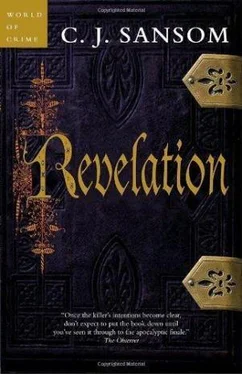Guy will visit him frequently. He cannot be certain Adam will not relapse, but he believes he will continue to make progress. And that the time when he might make some mad display is past. I hope he is right,' I added quietly.
'I shall never see him again,' Ellen said bleakly. I turned to look at her. She had retreated a couple of steps away from the open door.
'That is sad,' I said seriously. 'When you have done so much to help him. Guy says that without your persistence, your understanding of him, he doubts Adam would have made anything like the progress he has. The Kites would be glad to have you visit him, I am sure.'
'You know my situation, sir,' she said quietly. 'Please do not press me.'
Shawms appeared from his office, gave us a dirty look as he passed between us. When he had gone Ellen said, 'Will you do something for me, sir?' She spoke quickly, reddening, and I guessed she had had to screw up her courage to ask.
'Whatever I can, Ellen.'
'Will you come and visit me sometimes, when you have time? I love to hear what is happening in the outside world, I did not know the King was getting married again today until you told me. Everyone here is so locked inside their own worlds. . .'
'I would rather you made some venture into the outside world, Ellen. Come, will you not take just a few steps outside? You can hold on to my arm. Is it so hard?'
'Harder than you realize.' And indeed the very suggestion made her shrink back against the wall. 'Sir, there are those here like Adam who may be cured, with the help of good friends and those who love them. But there are others, like me, whose best hope of sanity lies in accepting their — disabilities.'
I looked at her. 'I will make a bargain with you, Ellen. I will come and see you, whenever I can, and tell you all the news. But I will also ask you to consider ways in which you may deal with your — difficulty, perhaps even overcome it. I would never make you go outside unless you were prepared to try, but equally I will never let the subject go.' I smiled. 'Is it a bargain?'
'You drive a hard deal, sir, like all lawyers.'
'I do. Will you agree my terms?'
She gave a small, sad smile. 'I will. And thank you for your care.'
Just then, a great clamour of bells began to ring across the city. We looked out through the open doorway, into the sunlit yard, listening to the joyful clamour. Out there, in a chapel in a palace, the King had finally married Catherine Parr.
The spring of 1543 brought another round in the struggle for power between religious reformers and reactionaries which dominated the later years of Henry VIII. Although Edward Seymour, Earl of Hertford, had begun his rise to power, the pre-eminent figure among the reformers remained Thomas Cranmer, whose close personal relationship with the King kept him in his key position as Archbishop of Canterbury. Part of his success was probably that, unlike Cromwell or Wolsey, he did not try to dominate the King.
Nonetheless, the return from abroad of the arch-conservative Bishop Stephen Gardiner led to attempts to unseat Cranmer with the assistance of London's Bishop Bonner. Religious radicals were hunted in Cranmer's households both in Cambridge and London, but nothing serious was found against him. The King frightened Cranmer by telling him, 'I know now who is the greatest heretic in Kent,' but turned the tables on Gardiner by appointing Cranmer himself to head a commission to investigate the allegations against him. I have largely followed the account of the attack on Cranmer given in Diarmaid MacCulloch's Cranmer (London 1996). It was probably autumn, rather than in the spring as I have indicated, that Cranmer found himself out of the woods.
Early 1543 also saw major attacks on Protestantism in Parliament and through a renewed campaign against radicals in London by Bishop Bonner. The Parliament of that year brought in strong anti-reformist legislation, notably forbidding the working classes and women to read the new English Bible, which under Cromwell's aegis had been placed in every parish church. I am very grateful to the librarian of St John's College, Cambridge, for allowing me to see their copy of the 1539 Great Bible, which may have belonged to Thomas Cromwell himself. I have used its phraseology in quoting from the Book of Revelation, though I have modernized the Tudor spelling. Susan Brigden's London and the Reformation (Oxford 1989) was an invaluable source for the campaign against the 'sectaries' in London, which included a manhunt for those who had broken the rules on eating meat in Lent. Her book portrays a London increasingly divided between radical and conservative parishes; the radicals, with their view of themselves as persecuted saints, often comforted themselves in the belief that Revelation foretold their eventual victory against the 'Beast' of Rome. Many believed then, exactly as Christian fundamentalists do today, that they lived in the 'last days' before Armageddon and, again just as now, saw signs all around in the world that they took as certain proof that the Apocalypse was imminent. Again like fundamentalists today, they looked on the prospect of the violent destruction of mankind without turning a hair. The remarkable similarity between the first Tudor Puritans and today's fundamentalist Christian fanatics extends to their selective reading of the Bible, their emphasis on the Book of Revelation, their certainty of their rightness, even to their phraseology. Where the Book of Revelation is concerned, I share the view of Guy, that the early church fathers released something very dangerous on the world when, after much deliberation, they decided to include it in the Christian canon.
Catherine Parr married Henry VIII in July 1543 following several months' courtship. Queen Catherine herself admitted years later that, unlike any of his previous queens, she had resisted the idea of marrying him. Partly at least this was because of her affection for Sir Thomas Seymour. It is uncertain whether Catherine Parr was already a reformist sympathizer by 1543; I think that she was, for otherwise she would have come to a sophisticated reformism only after marrying a King whose increasingly anti-reformist sympathies made such a religious position dangerous. That does not seem to me to make sense.
Tudor views of madness were more varied and more sophisticated than one might imagine. As with all branches of medicine, views of mental illness were based on the theory of imbalances between the 'four humours' of which the human body was made up. Thus, for example, the advice to the melancholic to eat salad because of its cold and wet properties. But there is also much evidence of 'common-sense' remedies, such as encourag-ing the 'melancholic' or 'mopish' (as upper-class and lower-class depressives were respectively called) to get out of the house, take the air, listen to music and enjoy cheerful conversation. I do not think Guy's solutions would have been unusual, although his interest in the subject of mental illness would have been. On the other hand, both Catholics and Protestants would often see the more florid types of mental illness as evidence of possession; Catholics tended to prescribe confession and appeal to sacred images, Protestants prayer and fasting. Occasionally, as happens to Adam Kite in the book, a mentally unstable religious obsessive could find himself in danger of being accused of heresy and burned at the stake. For early modern views of medicine, I found Roy Porter's A Social History of Madness (London 1987) a very useful introduction, while Michael MacDonald's Mystical Bedlam (Cambridge 1981) gives a fascinating picture of an early seventeenth-century therapist. His practice included cases of'salvation panic' such as that from which Adam Kite suffers, and which seems to have been a new phenomenon brought about by Lutheran and Calvinist notions of God's predestined division of humanity into the saved and the damned. It has reappeared often during fundamentalist campaigns in the centuries since - the first great Awakening in eighteenth-century colonial America featured several notable suicides by people who had come to believe they were irrevocably damned.
Читать дальше












